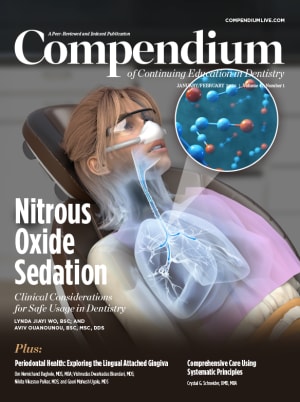Making the Digital Transition: A California Dental Practice Outlines Its Roadmap to CAD/CAM
Mark Friedman, DDS, and his son, Matt Friedman, DDS, are the owners of Friedman Dentistry in Encino, California, where they are committed to a digital workflow to include radiography, photography, and videography, as well as digital patient records. "Our philosophy has always been to embrace new technologies that would help us improve the patient care experience while also advancing the quality of restorative dentistry we provide," Mark Friedman says.
The practice offers a full range of restor-ative dentistry services. During treatment, patients are able to access streaming multimedia content on a suspended iPad with wireless headphones or observe their dental procedure live from a surgical microscope's camera. Notwithstanding their commitment to innovative technologies, the practitioners were initially resistant to incorporating in-office CAD/CAM. "We were led to believe that in-office or chairside CAD/CAM could only produce single units and small-span fixed partial dentures," the dentists say. "Those perceived limitations kept us from becoming early users of the technology."
Matt Friedman, who earned his DDS degree in 2003, was highly competent in computers and emerging technology. He made a strong argument for adding a new generation of commercial-quality CAD/CAM equipment to the practice. "Matt believed it would allow us to fabricate the full spectrum of indirect fixed and removable restorations in the office without traditional laboratory support. Our dissatisfaction and frustration with inconsistent dental laboratory support could no longer be ignored and was a strong motivating factor for us to make the change. If the new generation of CAD/CAM equipment could improve the quality control of our restorations and also be cost-effective and time-saving, it would unquestionably be a meaningful and beneficial transition," Mark Friedman explains.
To make the transition to digital easier to learn and manage, the Friedmans strongly recommend a step-by-step approach. Their experience resulted in the creation of a "roadmap" that they believe other clinicians can follow. "The first step in our digital evolution was to purchase an intraoral scanner. We quickly became proficient in scanning and were able to eliminate the need for and patients' distaste of traditional impressions."
Initially, the Friedmans sent intraoral scan files to a milling center and purchased a range of products, including a porcelain furnace, sintering oven, and a liquid ceramic shade modification system. In a short time, they became adept at finishing, shade alteration, contouring, glazing, and contact refinement. "These components and the acquired skills were transformative for our dental practice. We no longer needed to return restorations to a commercial dental laboratory for shade modification or altering a contact," Mark Friedman affirms. "Furthermore, we improved our understanding of tooth design to enhance our results with CAD/CAM restorations."
In making the digital transition, the Friedmans understood it was important to purchase the highest-quality hardware and software available that would be user-friendly and financially feasible. As they did their due diligence, they realized that it was actually very practical and cost-effective to use a commercial-grade five-axis milling machine in the office.
This, they say, would ultimately lead them to CAD/CAM equipment from Axsys Dental Solutions. Friedman Dentistry purchased the Versamill 5X-200 Precision Dental Machining Center from Axsys, and the dentists began doing their own milling in-office.
In addition to the Versamill 5X-200, Axsys also provided the necessary software and trained the clinicians on all the products and provided excellent support. The practice also would acquire a 3D printer and UV post-curing chamber.
Drs. Friedman state, "the Versamill 5X-200 has made it possible to fabricate the entire gamut of fixed and removable prostheses in a variety of materials, including PMMA, PEEK, zirconia, lithium disilicate, titanium, stainless steel, and chrome cobalt. It is a serious, professional, open-architecture machine that can be used with various design programs. Furthermore, it features a powerful 3,000-watt spindle and shares many of the attributes of the more expensive full-frame industrial CNC machines."
The Friedmans note that the satin-smooth, polished finish and sharp detailed margins of restorations produced on the five-axis milling unit are remarkable. They also point out that their decision to purchase the Versamill 5X-200 was aided by their discovery that a local dental milling center had purchased a fleet of the very same machines.
The father-and-son practitioners also stress the importance of training and support. "Successful fabrication of dental restorations with CAD/CAM is not always a given. When software or design issues present problems, Axsys Dental Solutions comes to our rescue by providing expert support," they say. "They are a true engineering company that gave us the necessary one-on-one training."
The company also offers a full line of CAD/CAM solutions for interested dentists and dental laboratories. "They offer many of the core elements of the ‘digital roadmap,' including a new intraoral scanner (MEDIT i500) as well as a variety of milling machines, software and tooling, furnaces, scanners, printers, and materials."
As the Friedmans reflect on their practice's transition to CAD/CAM, they only have positive feelings and no regrets. "Perhaps more dentists will come to realize that a commercial-quality system may be their best choice. If we started our transition to CAD/CAM today, the learning curve would be easier because of newer and improved available resources," they conclude. The two dentists also advise that identifying the right CAD/CAM partner is critical for a positive transition. "At Friedman Dentistry, we have confidence in the knowledge that our partnership with Axsys Dental Solutions can help us improve the patient care experience and advance the quality of our restorative dentistry using cutting-edge technology."
Axsys Dental Solutions
248-926-8810
axsysinc.com
